必修2 Module 3 Music 短文改错课件(24张PPT)
文档属性
| 名称 | 必修2 Module 3 Music 短文改错课件(24张PPT) |

|
|
| 格式 | zip | ||
| 文件大小 | 4.2MB | ||
| 资源类型 | 教案 | ||
| 版本资源 | 外研版 | ||
| 科目 | 英语 | ||
| 更新时间 | 2018-07-21 00:00:00 | ||
图片预览

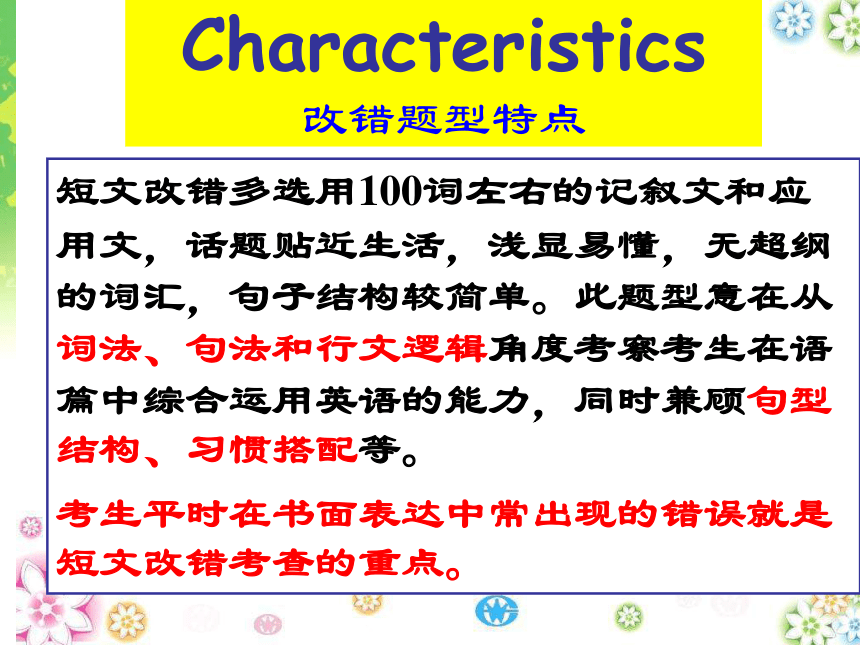
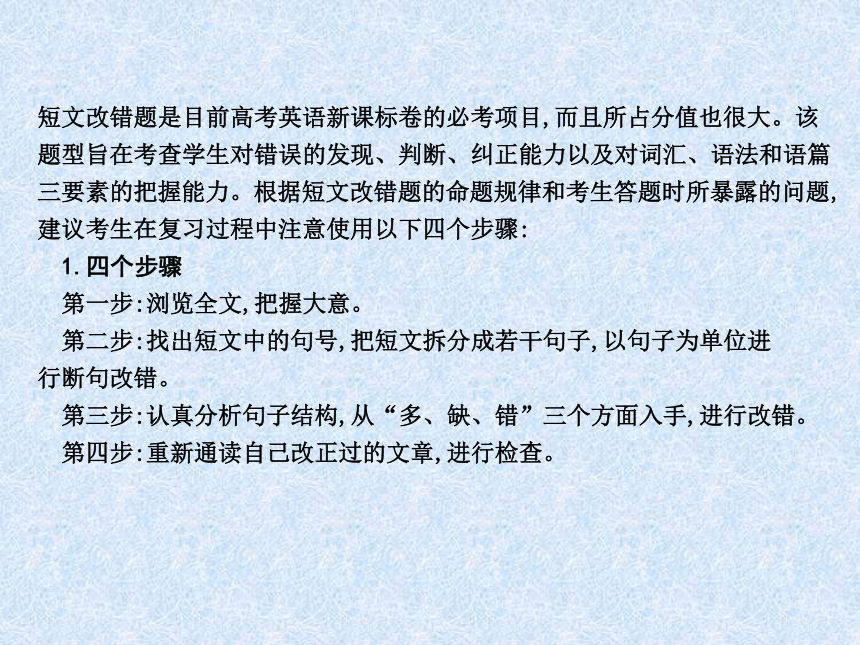
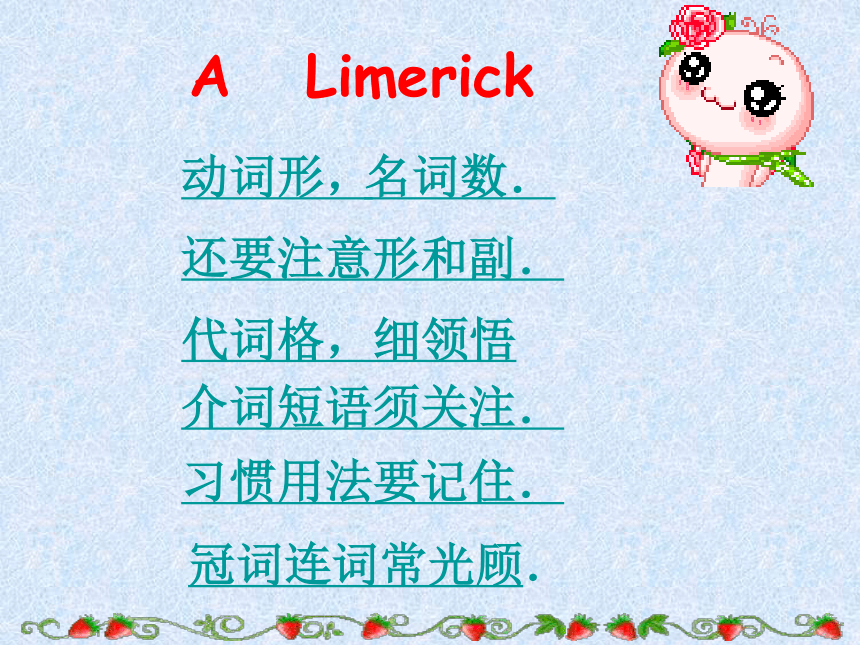
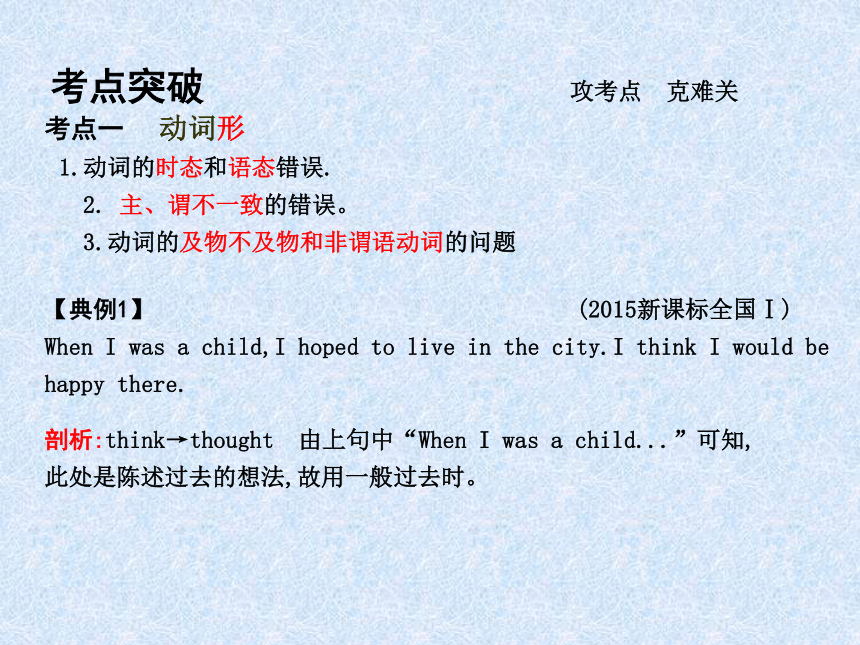
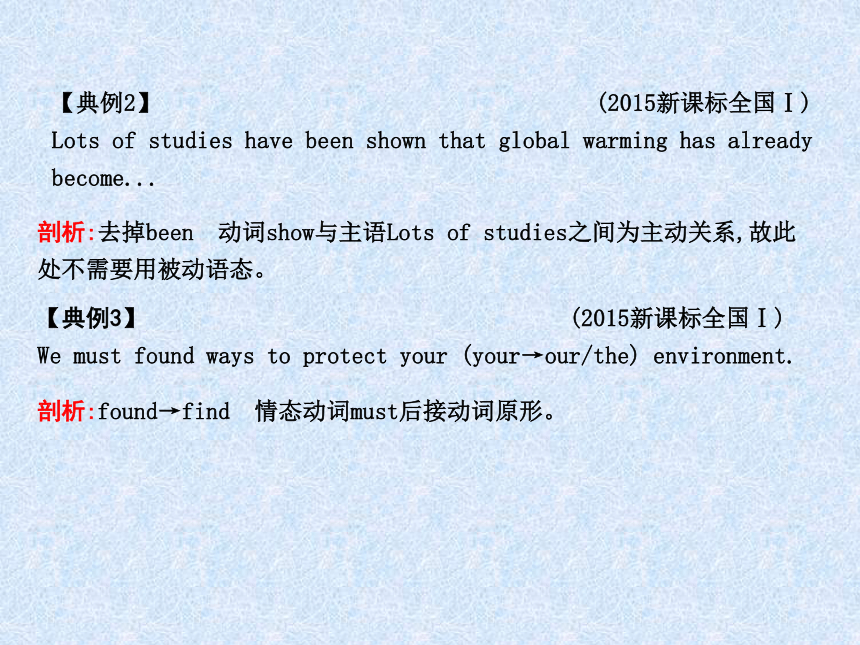
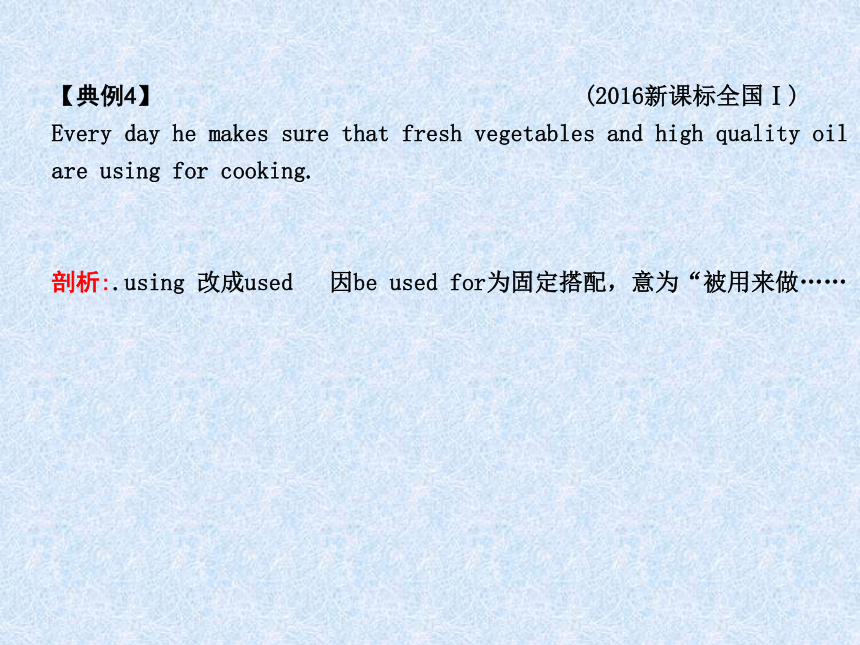
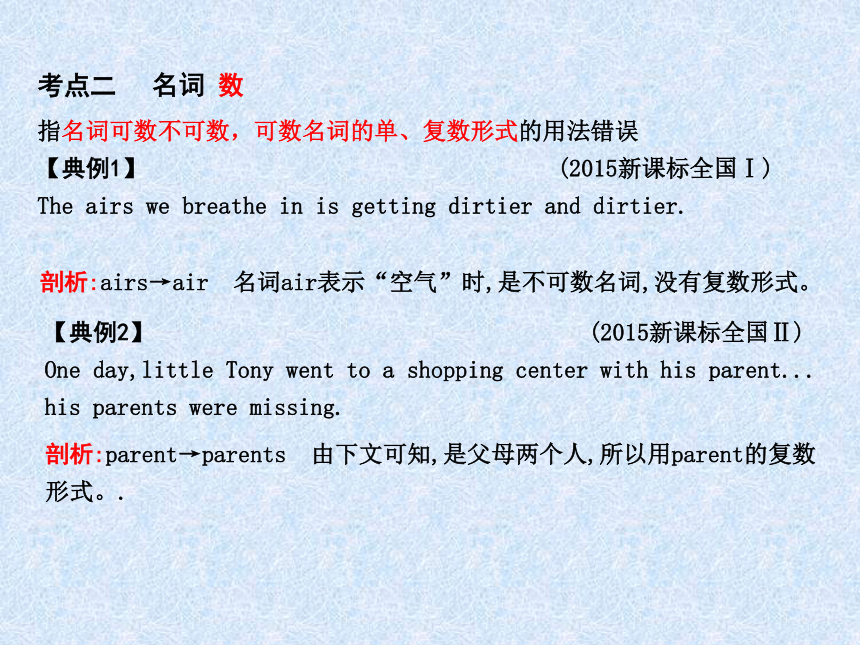
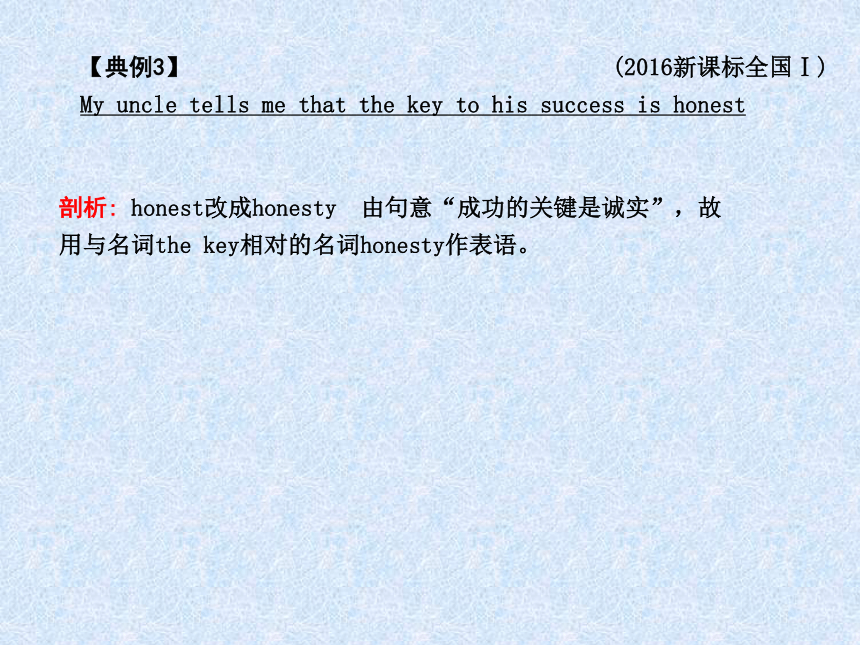
文档简介
课件24张PPT。短文改错短文改错多选用100词左右的记叙文和应用文,话题贴近生活,浅显易懂,无超纲的词汇,句子结构较简单。此题型意在从词法、句法和行文逻辑角度考察考生在语篇中综合运用英语的能力,同时兼顾句型结构、习惯搭配等。
考生平时在书面表达中常出现的错误就是短文改错考查的重点。Characteristics 改错题型特点短文改错题是目前高考英语新课标卷的必考项目,而且所占分值也很大。该题型旨在考查学生对错误的发现、判断、纠正能力以及对词汇、语法和语篇三要素的把握能力。根据短文改错题的命题规律和考生答题时所暴露的问题,建议考生在复习过程中注意使用以下四个步骤:
1.四个步骤
第一步:浏览全文,把握大意。
第二步:找出短文中的句号,把短文拆分成若干句子,以句子为单位进
行断句改错。
第三步:认真分析句子结构,从“多、缺、错”三个方面入手,进行改错。
第四步:重新通读自己改正过的文章,进行检查。动词形,名词数.还要注意形和副.代词格,细领悟介词短语须关注.
习惯用法要记住.冠词连词常光顾. A Limerick考点突破 攻考点 克难关考点一动词形
【典例1】 (2015新课标全国Ⅰ)
When I was a child,I hoped to live in the city.I think I would be happy there.剖析:think→thought 由上句中“When I was a child...”可知,此处是陈述过去的想法,故用一般过去时。1.动词的时态和语态错误.
2. 主、谓不一致的错误。
3.动词的及物不及物和非谓语动词的问题【典例2】 (2015新课标全国Ⅰ)
Lots of studies have been shown that global warming has already become...剖析:去掉been 动词show与主语Lots of studies之间为主动关系,故此处不需要用被动语态。【典例3】 (2015新课标全国Ⅰ)
We must found ways to protect your (your→our/the) environment.剖析:found→find 情态动词must后接动词原形。
【典例4】 (2016新课标全国Ⅰ)
Every day he makes sure that fresh vegetables and high quality oil are using for cooking.
剖析:.using 改成used 因be used for为固定搭配,意为“被用来做……考点二名词 数指名词可数不可数,可数名词的单、复数形式的用法错误
【典例1】 (2015新课标全国Ⅰ)
The airs we breathe in is getting dirtier and dirtier.剖析:airs→air 名词air表示“空气”时,是不可数名词,没有复数形式。【典例2】 (2015新课标全国Ⅱ)
One day,little Tony went to a shopping center with his parent... his parents were missing.剖析:parent→parents 由下文可知,是父母两个人,所以用parent的复数形式。.
剖析: honest改成honesty 由句意“成功的关键是诚实”,故用与名词the key相对的名词honesty作表语。【典例3】 (2016新课标全国Ⅰ)
My uncle tells me that the key to his success is honest考点三1.修饰名词,be动词,系动词要用形容词
2.修饰动词,形容词,过去分词,整个句子用副词
3.比较级和最高级的使用(切记无双重比较)
【典例1】 (2015新课标全国Ⅰ)
Lots of studies have been ( been ) shown that global warming has already become a very seriously problem. 剖析:seriously→serious 名词前需用形容词修饰
还要注意形和副. 【典例2】 (2016新课标全国Ⅰ)
He hopes that his business will grow steady.
剖析: steady改为steadily 修饰动词grow,表示“稳步地”发展,应用副词steadily【典例3】 (2015新课标全国Ⅰ)
Much rare animals are dying out.
剖析:Much→Many 名词animals为可数名词复数形式,故用many修饰。
【典例4】 (2015新课标全国Ⅱ)
Dad and I were terrible worried.
剖析:terrible→terribly 修饰形容词worried要用副词,故terrible改为terribly。四、 代词格,细领悟【典例1】 (2015新课标全国Ⅰ)
We must found (found→find) ways to protect the environment.剖析: your→our/the 根据句意可知此处的形容词性物主代词应该与句子的主语We保持一致,故应用our,或改为the。【典例2】 (2015新课标全国Ⅱ)
...his parents were missing...Five minutes later,Tony saw parents.Mom said,“How nice to see you again! Dad and I...”剖析:saw后加his 由上下文可知,Tony看到的是他的父母,故saw后加his。【典例3】 (2016新课标全国Ⅰ)
He hopes that our business will grow steadily. .
剖析: our 改成his 根据主语he可知,指“他的”事业,用形容词性物主代词his。
考点六、介词短语须关注,
习惯用法要记住.
【典例1】 (2015新课标全国Ⅰ)
Unfortunately,on the development of industrialization,the environment has been polluted.剖析: on→with with the development of随着……的发展,为固定搭配。【典例2】 (2015新课标全国Ⅱ)
Tony saw a toy on a shop window.剖析:on→in 玩具应该是在橱窗里面。
主要考查固定短语,固定介词的搭配。【典例3】 (2016新课标全国Ⅰ)
My uncle says that he never dreams becoming rich in a short period of time
剖析:在dreams后加of/about 因dream of/about doing sth.为固定搭配,意为“梦想做某事考点七冠词 1. 冠词a, an和the的用法错误.
2.连词but,and,or, because,so和although的用法错误
【典例1】 (2015新课标全国Ⅰ)
Now I am living in a city,but I miss my home in countryside.剖析: countryside前加the 句意:我现在居住在城市,但是我想念我农村的家。in the countryside在农村。【典例2】 (2015新课标全国Ⅱ)
...he quickly walked into the shop...A woman saw him crying and telling(told) him to wait outside a shop.剖析:a→the 特指上文提到的商店,故应该用定冠词the。
六、冠词连词常光顾【典例3】 (2015新课标全国Ⅰ)
There the air is clean or the mountains are green.剖析: or→and 根据上下文可知前后两句为并列关系,故用并列连词and。or表示选择,不符合语境。【典例4】 (2015新课标全国Ⅱ)
After looks (looks→looking) at the toy for some time,he turned around and found where his parents were missing.剖析:where→that或者去掉where 根据句意“……他转过身,发现父母不见了”可知,此处作动词found的宾语,宾语从句句意完整,不缺少成分,应用that引导,that也可省略。【典例3】 (2016新课标全国Ⅰ)
My uncle says that he never dreams of becoming rich in the short period of time.
剖析: the 改成a 意思是“在一段短时期内”致富,表示“一段”用a。
【典例4】 (2016新课标全国Ⅰ
My uncle is the owner of a restaurant close to that I live. .
剖析: that 改成 where 介词to后应是宾语从句,在从句中作地点状语,用where,意为“……的地方”,close to where I live (离我住的地方不远的)是形容词短语作后置定语,修饰a restaurant。
短文改错题是目前高考英语新课标卷的必考项目,而且所占分值也很大。该题型旨在考查学生对错误的发现、判断、纠正能力以及对词汇、语法和语篇三要素的把握能力。根据短文改错题的命题规律和考生答题时所暴露的问题,建议考生在复习过程中注意使用以下四个步骤:
1.四个步骤
第一步:浏览全文,把握大意。
第二步:找出短文中的句号,把短文拆分成若干句子,以句子为单位进
行断句改错。
第三步:认真分析句子结构,从“多、缺、错”三个方面入手,进行改错。
第四步:重新通读自己改正过的文章,进行检查。The summer holiday is coming. My classmates and I are talking about how to do during the holiday. We can chose between staying at home and take a trip. If we stay at home, it is comfortable but there is no need to spend money. But in that case, we will learn little about world. If we go on a trip abroad, we can broaden your view and gain knowledges we cannot get from book. Some classmates suggest we should go to places of interest nearby. I thought that it is a good idea. It does not cost many, yet we can still learn a lot.
51. how→what 句法错误。do后缺宾语,应将how改为what。?
52. chose→choose 句法错误。情态动词后接动词原形。chose的原形是choose。?
53. take→taking 词法错误。between...and...在……和……之间,是固定结构。and前后连接的是并列成分。and前用了动名词(staying),and后也应用动名词(taking)。?
54. but→and 行文逻辑错误。comfortable与no need to spend money之间是并列关系,不是转折关系。
55. world前加the 词法错误。world是独一无二的事物,前面要加定冠词the。?
?
?56. your→our 行文逻辑错误。由前面的we go on a trip和we can broaden可知,应把your改为our。?
57. knowledges→knowledge 词法错误。knowledge意为“知识”,是不可数名词,没有复数形式。?
58. 去掉can或者can→should 句法错误。suggest在此处表示“建议”,后接宾语从句时,从句要用虚拟语气,即谓语用“should+动词原形”,should可以省略。?
59. thought→think 句法错误。由前面的suggest和后面的does not cost可知,此处用一般现在时。I thought表示“原以为,本以为”。?
60. many→much 词法错误。cost表示“花费(时间、金钱等)”时,宾语是不可数名词,故用much。?
考生平时在书面表达中常出现的错误就是短文改错考查的重点。Characteristics 改错题型特点短文改错题是目前高考英语新课标卷的必考项目,而且所占分值也很大。该题型旨在考查学生对错误的发现、判断、纠正能力以及对词汇、语法和语篇三要素的把握能力。根据短文改错题的命题规律和考生答题时所暴露的问题,建议考生在复习过程中注意使用以下四个步骤:
1.四个步骤
第一步:浏览全文,把握大意。
第二步:找出短文中的句号,把短文拆分成若干句子,以句子为单位进
行断句改错。
第三步:认真分析句子结构,从“多、缺、错”三个方面入手,进行改错。
第四步:重新通读自己改正过的文章,进行检查。动词形,名词数.还要注意形和副.代词格,细领悟介词短语须关注.
习惯用法要记住.冠词连词常光顾. A Limerick考点突破 攻考点 克难关考点一动词形
【典例1】 (2015新课标全国Ⅰ)
When I was a child,I hoped to live in the city.I think I would be happy there.剖析:think→thought 由上句中“When I was a child...”可知,此处是陈述过去的想法,故用一般过去时。1.动词的时态和语态错误.
2. 主、谓不一致的错误。
3.动词的及物不及物和非谓语动词的问题【典例2】 (2015新课标全国Ⅰ)
Lots of studies have been shown that global warming has already become...剖析:去掉been 动词show与主语Lots of studies之间为主动关系,故此处不需要用被动语态。【典例3】 (2015新课标全国Ⅰ)
We must found ways to protect your (your→our/the) environment.剖析:found→find 情态动词must后接动词原形。
【典例4】 (2016新课标全国Ⅰ)
Every day he makes sure that fresh vegetables and high quality oil are using for cooking.
剖析:.using 改成used 因be used for为固定搭配,意为“被用来做……考点二名词 数指名词可数不可数,可数名词的单、复数形式的用法错误
【典例1】 (2015新课标全国Ⅰ)
The airs we breathe in is getting dirtier and dirtier.剖析:airs→air 名词air表示“空气”时,是不可数名词,没有复数形式。【典例2】 (2015新课标全国Ⅱ)
One day,little Tony went to a shopping center with his parent... his parents were missing.剖析:parent→parents 由下文可知,是父母两个人,所以用parent的复数形式。.
剖析: honest改成honesty 由句意“成功的关键是诚实”,故用与名词the key相对的名词honesty作表语。【典例3】 (2016新课标全国Ⅰ)
My uncle tells me that the key to his success is honest考点三1.修饰名词,be动词,系动词要用形容词
2.修饰动词,形容词,过去分词,整个句子用副词
3.比较级和最高级的使用(切记无双重比较)
【典例1】 (2015新课标全国Ⅰ)
Lots of studies have been ( been ) shown that global warming has already become a very seriously problem. 剖析:seriously→serious 名词前需用形容词修饰
还要注意形和副. 【典例2】 (2016新课标全国Ⅰ)
He hopes that his business will grow steady.
剖析: steady改为steadily 修饰动词grow,表示“稳步地”发展,应用副词steadily【典例3】 (2015新课标全国Ⅰ)
Much rare animals are dying out.
剖析:Much→Many 名词animals为可数名词复数形式,故用many修饰。
【典例4】 (2015新课标全国Ⅱ)
Dad and I were terrible worried.
剖析:terrible→terribly 修饰形容词worried要用副词,故terrible改为terribly。四、 代词格,细领悟【典例1】 (2015新课标全国Ⅰ)
We must found (found→find) ways to protect the environment.剖析: your→our/the 根据句意可知此处的形容词性物主代词应该与句子的主语We保持一致,故应用our,或改为the。【典例2】 (2015新课标全国Ⅱ)
...his parents were missing...Five minutes later,Tony saw parents.Mom said,“How nice to see you again! Dad and I...”剖析:saw后加his 由上下文可知,Tony看到的是他的父母,故saw后加his。【典例3】 (2016新课标全国Ⅰ)
He hopes that our business will grow steadily. .
剖析: our 改成his 根据主语he可知,指“他的”事业,用形容词性物主代词his。
考点六、介词短语须关注,
习惯用法要记住.
【典例1】 (2015新课标全国Ⅰ)
Unfortunately,on the development of industrialization,the environment has been polluted.剖析: on→with with the development of随着……的发展,为固定搭配。【典例2】 (2015新课标全国Ⅱ)
Tony saw a toy on a shop window.剖析:on→in 玩具应该是在橱窗里面。
主要考查固定短语,固定介词的搭配。【典例3】 (2016新课标全国Ⅰ)
My uncle says that he never dreams becoming rich in a short period of time
剖析:在dreams后加of/about 因dream of/about doing sth.为固定搭配,意为“梦想做某事考点七冠词 1. 冠词a, an和the的用法错误.
2.连词but,and,or, because,so和although的用法错误
【典例1】 (2015新课标全国Ⅰ)
Now I am living in a city,but I miss my home in countryside.剖析: countryside前加the 句意:我现在居住在城市,但是我想念我农村的家。in the countryside在农村。【典例2】 (2015新课标全国Ⅱ)
...he quickly walked into the shop...A woman saw him crying and telling(told) him to wait outside a shop.剖析:a→the 特指上文提到的商店,故应该用定冠词the。
六、冠词连词常光顾【典例3】 (2015新课标全国Ⅰ)
There the air is clean or the mountains are green.剖析: or→and 根据上下文可知前后两句为并列关系,故用并列连词and。or表示选择,不符合语境。【典例4】 (2015新课标全国Ⅱ)
After looks (looks→looking) at the toy for some time,he turned around and found where his parents were missing.剖析:where→that或者去掉where 根据句意“……他转过身,发现父母不见了”可知,此处作动词found的宾语,宾语从句句意完整,不缺少成分,应用that引导,that也可省略。【典例3】 (2016新课标全国Ⅰ)
My uncle says that he never dreams of becoming rich in the short period of time.
剖析: the 改成a 意思是“在一段短时期内”致富,表示“一段”用a。
【典例4】 (2016新课标全国Ⅰ
My uncle is the owner of a restaurant close to that I live. .
剖析: that 改成 where 介词to后应是宾语从句,在从句中作地点状语,用where,意为“……的地方”,close to where I live (离我住的地方不远的)是形容词短语作后置定语,修饰a restaurant。
短文改错题是目前高考英语新课标卷的必考项目,而且所占分值也很大。该题型旨在考查学生对错误的发现、判断、纠正能力以及对词汇、语法和语篇三要素的把握能力。根据短文改错题的命题规律和考生答题时所暴露的问题,建议考生在复习过程中注意使用以下四个步骤:
1.四个步骤
第一步:浏览全文,把握大意。
第二步:找出短文中的句号,把短文拆分成若干句子,以句子为单位进
行断句改错。
第三步:认真分析句子结构,从“多、缺、错”三个方面入手,进行改错。
第四步:重新通读自己改正过的文章,进行检查。The summer holiday is coming. My classmates and I are talking about how to do during the holiday. We can chose between staying at home and take a trip. If we stay at home, it is comfortable but there is no need to spend money. But in that case, we will learn little about world. If we go on a trip abroad, we can broaden your view and gain knowledges we cannot get from book. Some classmates suggest we should go to places of interest nearby. I thought that it is a good idea. It does not cost many, yet we can still learn a lot.
51. how→what 句法错误。do后缺宾语,应将how改为what。?
52. chose→choose 句法错误。情态动词后接动词原形。chose的原形是choose。?
53. take→taking 词法错误。between...and...在……和……之间,是固定结构。and前后连接的是并列成分。and前用了动名词(staying),and后也应用动名词(taking)。?
54. but→and 行文逻辑错误。comfortable与no need to spend money之间是并列关系,不是转折关系。
55. world前加the 词法错误。world是独一无二的事物,前面要加定冠词the。?
?
?56. your→our 行文逻辑错误。由前面的we go on a trip和we can broaden可知,应把your改为our。?
57. knowledges→knowledge 词法错误。knowledge意为“知识”,是不可数名词,没有复数形式。?
58. 去掉can或者can→should 句法错误。suggest在此处表示“建议”,后接宾语从句时,从句要用虚拟语气,即谓语用“should+动词原形”,should可以省略。?
59. thought→think 句法错误。由前面的suggest和后面的does not cost可知,此处用一般现在时。I thought表示“原以为,本以为”。?
60. many→much 词法错误。cost表示“花费(时间、金钱等)”时,宾语是不可数名词,故用much。?
